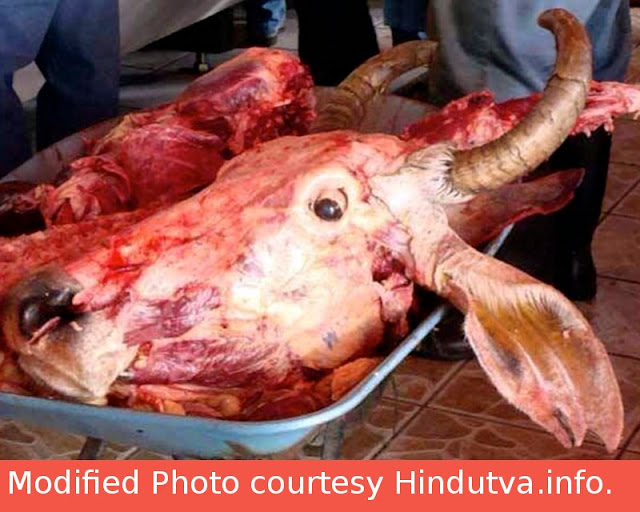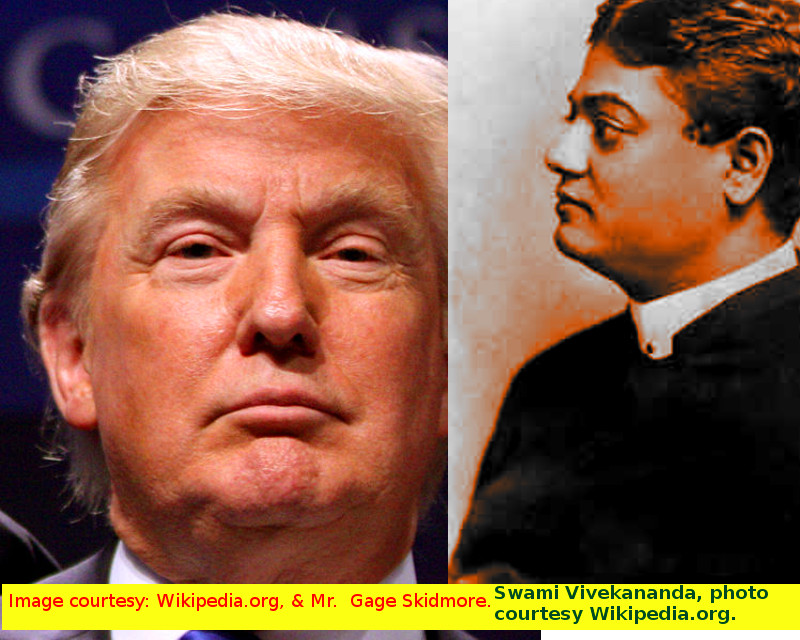#192, Difference between God and Guru
Here is a link to a blog post titled "Difference between God and Guru":
Click to see: Excerpts from the book: Nithyopanishad -- based on the discourses of Paramahamsa Nithyananda on The Master-Disciple Relationship at the Himalayan Yatra 2005.
I wanted to write a comment there itself, but since they blocked comments, I am compelled to write my comments in a blog post here, for the benefit of my readers.
Besides, they claimed copy right on the story quoted by them attributed to Vivekananda, I am unable to reproduce the story here.
I have tried to trace and test the originality of the story by searching it in the Complete Works of Swami Vivekananda, but could not succeed.
Hence I am unable to vouchsafe that the incident narrated by Nityananda had actually taken place, unless they provide evidence.
Anyway, in the story Vivekananda was arrogant and haughty on the disciple for saying that God was omnipresent, omniscient and omnipotent. (Present everywhere; knows everything; all powerful.)
These three attributes are a part of the commonly accepted definition of God, globally. But Vivekananda blasted the student and advised him to believe that : "Enlightened masters are God standing in front of us".
Then the disciple wanted to know whether Vivekananda himself was the God (the student thought that Vivekananda was an enlightened master).
Now, Vivekananda again blasted the disciple for asking him whether he was God, without knowing what or who was God. Swamiji then clarified to the disciple that God could not be defined and that he should be experienced.
BLOGGER'S VIEW -1
For any discussion, a definition of the subject matter is necessary. If exact definition is not possible, we can make a beginning at least with an approximate definition. The disciple had at least an approximate definition.
What was the definition of God according to Swamiji when he said "Enlightened masters are God standing in front of us" ?
Masters (Gurus- whether enlightened or not) are not omniscient or omnipresent or omnipotent.
Vivekananda's belief in enlightened masters being God was based on his perceived personal experience with Ramakrishna. This perception, how could he impose on the disciple who didn't see Ramakrishna, leave alone touching him. Thus Vivekananda's definition has limited applicability only to him.
BLOGGER'S VIEW -2
According to Compact Oxford Dictionary at AskOxford.com:
God: • noun 1 (in Christianity and other monotheistic religions) the creator and supreme ruler of the universe. 2 (god) a superhuman being or spirit worshipped as having power over nature and human fortunes. 3 (god) a greatly admired or influential person. 4 (the gods) informal the gallery in a theatre.
If we take definitions 1 and 2 as the bases for our discussion: A Guru cannot be equal to the Creator and the Supreme ruler of the Universe. A Guru cannot be a superhuman being or spirit worshipped as having power over nature and human fortunes.
According to Cambridge Advanced Learner's Dictionary: "the being which made the Universe, the Earth and its People and is believed to have an effect on all things".
If we discuss on the basis of this definition, a Guru does not create the Universe, the Earth or its People nor does he have an effect on all things".
Thus a Guru can never equal God. This is mostly true in respect of all the major religions of the world. For example, in Islam, the followers believe that Mohammed was a prophet and messenger of God. In Christianity, Jesus was son and messenger of God. Even today, a Pope is not treated as equal to God by Catholics. Essentially, a Guru is a preacher, who may know more than his disciple. A Guru can pass on to his disciple whatever little the Guru knew, provided the Guru has the capacity to express himself effectively either through language tools or through body gestures.
The case is different with concrete substances. For example, a Guru can bring a spoonful of salt and tell the student to taste it and experience the 'salt taste'. But this cannot be the case in case of an unknown abstract term like 'God'.
Of Course, in Hinduism, there is a verse: Gurur Brahma, Gurur Vishnu, Gurur deevo Maheswara, Guru Saakshaat Parabrahma, tasmai sri Guraveen namaha.. Its gist is: Guru is the Creator (Brahma), Guru is the all pervading protector (Vishnu) and the Great Lord (Maheswara) and the Supreme Spirit (Parabrahma). Hence I salute thee Guru!
Utmost reverence to Guru is welcome. But blind faith in the capabilities of Guru will be futile. 1. A blind man cannot show way to another blind man. 2. It is difficult to test whether the Guru was blind (fully ignorant or partly ignorant). 3. Though Vivekananda was said to have tested his Guru Ramakrishna, his testing method was (in my view) inadequate.
Also, pl. see my post: Click to see post No. 079 "Granted that Ramakrishna was a sham".
Click to see: Excerpts from the book: Nithyopanishad -- based on the discourses of Paramahamsa Nithyananda on The Master-Disciple Relationship at the Himalayan Yatra 2005.
I wanted to write a comment there itself, but since they blocked comments, I am compelled to write my comments in a blog post here, for the benefit of my readers.
Besides, they claimed copy right on the story quoted by them attributed to Vivekananda, I am unable to reproduce the story here.
I have tried to trace and test the originality of the story by searching it in the Complete Works of Swami Vivekananda, but could not succeed.
Hence I am unable to vouchsafe that the incident narrated by Nityananda had actually taken place, unless they provide evidence.
Anyway, in the story Vivekananda was arrogant and haughty on the disciple for saying that God was omnipresent, omniscient and omnipotent. (Present everywhere; knows everything; all powerful.)
These three attributes are a part of the commonly accepted definition of God, globally. But Vivekananda blasted the student and advised him to believe that : "Enlightened masters are God standing in front of us".
Then the disciple wanted to know whether Vivekananda himself was the God (the student thought that Vivekananda was an enlightened master).
Now, Vivekananda again blasted the disciple for asking him whether he was God, without knowing what or who was God. Swamiji then clarified to the disciple that God could not be defined and that he should be experienced.
BLOGGER'S VIEW -1
For any discussion, a definition of the subject matter is necessary. If exact definition is not possible, we can make a beginning at least with an approximate definition. The disciple had at least an approximate definition.
What was the definition of God according to Swamiji when he said "Enlightened masters are God standing in front of us" ?
Masters (Gurus- whether enlightened or not) are not omniscient or omnipresent or omnipotent.
Vivekananda's belief in enlightened masters being God was based on his perceived personal experience with Ramakrishna. This perception, how could he impose on the disciple who didn't see Ramakrishna, leave alone touching him. Thus Vivekananda's definition has limited applicability only to him.
BLOGGER'S VIEW -2
According to Compact Oxford Dictionary at AskOxford.com:
God: • noun 1 (in Christianity and other monotheistic religions) the creator and supreme ruler of the universe. 2 (god) a superhuman being or spirit worshipped as having power over nature and human fortunes. 3 (god) a greatly admired or influential person. 4 (the gods) informal the gallery in a theatre.
If we take definitions 1 and 2 as the bases for our discussion: A Guru cannot be equal to the Creator and the Supreme ruler of the Universe. A Guru cannot be a superhuman being or spirit worshipped as having power over nature and human fortunes.
According to Cambridge Advanced Learner's Dictionary: "the being which made the Universe, the Earth and its People and is believed to have an effect on all things".
If we discuss on the basis of this definition, a Guru does not create the Universe, the Earth or its People nor does he have an effect on all things".
Thus a Guru can never equal God. This is mostly true in respect of all the major religions of the world. For example, in Islam, the followers believe that Mohammed was a prophet and messenger of God. In Christianity, Jesus was son and messenger of God. Even today, a Pope is not treated as equal to God by Catholics. Essentially, a Guru is a preacher, who may know more than his disciple. A Guru can pass on to his disciple whatever little the Guru knew, provided the Guru has the capacity to express himself effectively either through language tools or through body gestures.
The case is different with concrete substances. For example, a Guru can bring a spoonful of salt and tell the student to taste it and experience the 'salt taste'. But this cannot be the case in case of an unknown abstract term like 'God'.
Of Course, in Hinduism, there is a verse: Gurur Brahma, Gurur Vishnu, Gurur deevo Maheswara, Guru Saakshaat Parabrahma, tasmai sri Guraveen namaha.. Its gist is: Guru is the Creator (Brahma), Guru is the all pervading protector (Vishnu) and the Great Lord (Maheswara) and the Supreme Spirit (Parabrahma). Hence I salute thee Guru!
Utmost reverence to Guru is welcome. But blind faith in the capabilities of Guru will be futile. 1. A blind man cannot show way to another blind man. 2. It is difficult to test whether the Guru was blind (fully ignorant or partly ignorant). 3. Though Vivekananda was said to have tested his Guru Ramakrishna, his testing method was (in my view) inadequate.
Also, pl. see my post: Click to see post No. 079 "Granted that Ramakrishna was a sham".



Comments